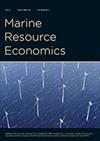牡蛎经济学:捕捞和未捕捞的珊瑚礁、海底水产养殖和生活海岸的模拟成本、市场回报和非市场生态系统效益
IF 1.7
3区 经济学
Q2 ECONOMICS
引用次数: 4
摘要
我们模拟了与四种牡蛎资源相关的预期成本、市场回报和非市场生态系统效益:收获的底层珊瑚礁、离底水产养殖、未收获(恢复)的珊瑚礁和生活的海岸线。收益类别包括收获带来的市场回报、水质改善(减少氮)、其他物种的栖息地(蓝蟹和红鼓)以及海岸线保护。海底珊瑚礁和海底水产养殖既能产生市场回报,也能产生非市场生态系统效益,而未捕捞的珊瑚礁和活海岸线只能产生非市场的生态系统效益。相对于收获和未收获的珊瑚礁,海底水产养殖和生活海岸线的总体总效益预计将更大,变化也更大。我们发现,收获的海底珊瑚礁、海底水产养殖和生活海岸线通常会产生正的净效益,但未收获的恢复珊瑚礁预计只有36%的时间会产生正净效益。我们讨论了这些估计的不确定性和局限性。本文章由计算机程序翻译,如有差异,请以英文原文为准。
Oyster Economics: Simulated Costs, Market Returns, and Nonmarket Ecosystem Benefits of Harvested and Nonharvested Reefs, Off-Bottom Aquaculture, and Living Shorelines
We simulate expected costs, market returns, and nonmarket ecosystem benefits associated with four oyster resources: harvested bottom reefs, off-bottom aquaculture, nonharvested (restored) reefs, and living shorelines. Benefit categories include market returns from harvest, improved water quality (reduced nitrogen), habitat for other species (blue crab and red drum), and shoreline protection. Bottom reefs and off-bottom aquaculture yield both market returns and nonmarket ecosystem benefits, whereas nonharvested reefs and living shorelines yield only nonmarket ecosystem benefits. Overall gross benefits are expected to be greater and much more variable for off-bottom aquaculture and living shorelines relative to harvested and nonharvested reefs. We find that harvested bottom reefs, off-bottom aquaculture, and living shorelines are expected to yield positive net benefits more often than not, but that nonharvested restored reefs are expected to yield positive net benefits only 36% of the time. We discuss the uncertainty and limitations surrounding these estimates.
求助全文
通过发布文献求助,成功后即可免费获取论文全文。
去求助
来源期刊

Marine Resource Economics
农林科学-渔业
CiteScore
4.30
自引率
10.30%
发文量
25
审稿时长
>12 weeks
期刊介绍:
Marine Resource Economics (MRE) publishes creative and scholarly economic analyses of a range of issues related to natural resource use in the global marine environment. The scope of the journal includes conceptual and empirical investigations aimed at addressing real-world oceans and coastal policy problems. Examples include studies of fisheries, aquaculture, seafood marketing and trade, marine biodiversity, marine and coastal recreation, marine pollution, offshore oil and gas, seabed mining, renewable ocean energy sources, marine transportation, coastal land use and climate adaptation, and management of estuaries and watersheds.
 求助内容:
求助内容: 应助结果提醒方式:
应助结果提醒方式:


